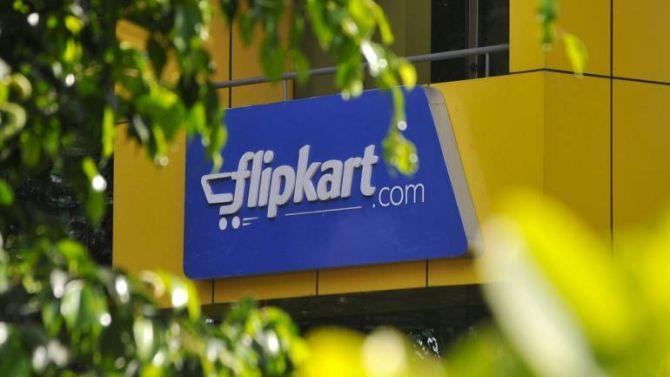Eight years ago, Flipkart started a new service called Nearby to deliver fruit, vegetable, soap, and other everyday items from supermarkets to customers within an hour of receiving the order.

Nearby shut down in less than five months because of insufficient customer demand and unsustainably thin margins.
Five years after Nearby, in 2020, Flipkart stirred itself again and launched Flipkart Quick, a 90-minute grocery delivery service.
The delivery time was later reduced to 30 to 45 minutes.
Within five months, Flipkart scaled Quick down substantially and, instead, chose to focus on Supermart, its next-day grocery delivery service.
Now, the Bengaluru-based ecommerce firm, owned by Walmart, could be at it again.
Though the firm has kept mum on the subject — it declined to comment on this story — there is a buzz that it is sharpening its claws for a stab at quick commerce once again and planning a service that would make deliveries within 15 to 30 minutes.
And this could start in a couple of months.
It is a space that — while Flipkart was away — has come to be identified with startups such as Zepto, which first created a name for itself by promising 10-minute deliveries, and Blinkit, which is now in Zomato’s fold, in addition to Swiggy Instamart and BigBasket’s BB Now.
This group, according to industry sources, is taking business away from entrenched large-format online retailers, such as Amazon, and — you guessed it — Flipkart.
Recently, Deepinder Goyal, cofounder and CEO of Zomato, said at the Startup Mahakumbh in New Delhi that Blinkint would become larger than Zomato’s food delivery business in a year.
The Gurgaon-based publicly-listed firm, which acquired Blinkit two years ago, is preparing to take the latter beyond grocery into broader ecommerce.
Zepto, for its part, became the first Indian unicorn of 2023, in the midst of the so-called funding winter.
“In the dynamic landscape of retail and ecommerce, one trend has emerged as a game changer: The meteoric rise of quick commerce in India,” according to a report by Kushal Bhatnagar, associate partner, Redseer Strategy Consultants.
“Q-commerce, with a $2.8 billion current market size, is set to become a disruptive force, poised to reshape the retail industry as we know it.”
If Flipkart is indeed getting back into quick commerce, someone in the company has been reading the tea leaves being served by Zepto, Blinkit, and other quick commerce players.
How will the big fish’s entry stir the pot?
While Flipkart is not divulging details, here is a look at the details already available.
Infrastructure and execution Flipkart does have the potential to disrupt quick commerce, say analysts.
Sources say it could set up thousands of dark stores — brick-and-mortar warehouses for fulfilling orders received online — across major cities.
It is said to be in talks with small entrepreneurs and kirana stores to set up these dark stores.
However, analysts also emphasise the criticality of execution.
“Execution in the quick commerce space is not easy, and companies need to have a specific DNA to move to positive unit economics,” said brokerage house BofA Securities in a note.
As such, Blinkit and Zepto, exclusively focused on quick commerce, could have the edge.
But Flipkart is no pushover, either.
It has already started same-day deliveries in 20 cities for mobiles, essential items, electronics, home appliances, fashion, books, and lifestyle products.
Sources say it is witnessing demand not just for grocery, fruit, vegetable, and other staples, but also for products related to beauty, electronics, home décor, and wellness.
That said, not every area Flipkart has entered into has seen massive disruption, be it travel aggregation (Flipkart acquired Cleartrip in 2021) or social commerce, where though Flipkart’s Shposy has expanded the market, Meesho remains the leader.
The quick commerce incumbents are well-placed.
At least three of them operate at an annualised GMV (gross merchandise value) run-rate of more than $1 billion.
As of the fourth quarter of calendar year 2023, Blinkit was the leader, with an estimated 46 per cent market share, on the basis of its annualised GMV of $1.7 billion, followed by Swiggy Instamart (27 per cent market share), Zepto (21 per cent), and BigBasket-owned BB Now (7 per cent), says a report by JM Financial.
Blinkit is the best-placed in terms of the balance sheet, as the consolidated Zomato business had net cash of Rs 12,000 crore as of December 2023.
Its food delivery segment is highly profitable.
Zepto is expected to achieve break-even over the next two quarters, according to recent management comments, and Swiggy has a strong net cash balance sheet and a profitable online food delivery business.
Flipkart’s success in quick commerce could hinge on its ability to find a strong product-market fit, solve the complexity of hyperlocal delivery, optimise its technology and supply chain for quick turnarounds, and create a differentiated brand focused on q-commerce de-linked from its traditional offering, according to analysts at JM Financial.
A matter of efficiency
Flipkart, said its CEO Kalyan Krishnamurthy recently, had over the past two years been working to reduce costs.
The company is close to hitting profitability, as it inches towards an initial public offering, likely in 2025-2026.
This focus on efficiency may come in handy in quick commerce, which relies on execution.
For instance, the dark stores it is said to be setting up could be a capital-intensive exercise.
But, as mentioned earlier, Flipkart plans to collaborate with entrepreneurs and kiranas to set up these stores; it will not own any.
The company has been delivering more than 120 million packages a month.
It has invested in building a robust supply chain to reach customers across the country, even in remote postal codes.
Sources say it is prepared for any remaining capex requirements after raising a massive $600 million from its parent company, Walmart, and another investor, in December.
It is in talks with investors to raise a total funding round of about $1 billion, according to sources.
Platforms like Blinkit and Zepto are, meanwhile, venturing into broader ecommerce, adding categories such as smartphones, electronics, gifting, apparel, pet and baby care, etc, which analysts say, can drive robust growth.
Flipkart, though, with its ecommerce DNA and wider catalogue, might have the upper hand in this realm.
Regardless, groceries and fast-moving consumer goods still account for around 75 per cent of the GMV for key q-commerce platforms, as the category remains a major driver in frequency, according to data from brokerage firm Elara Capital.
Therefore, Flipkart’s ecommerce advantage might not come into play in quick commerce all that quickly.












 © 2025
© 2025